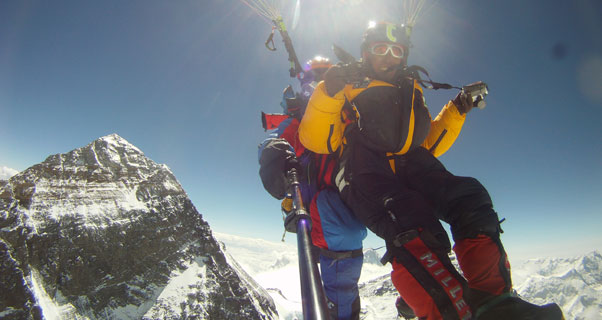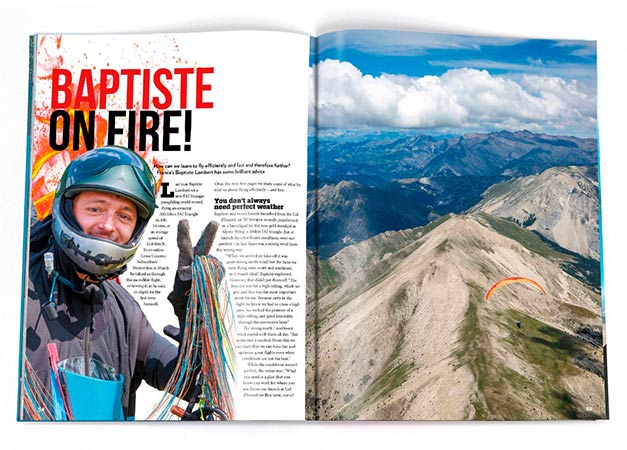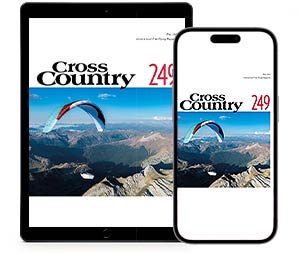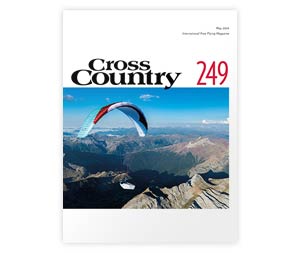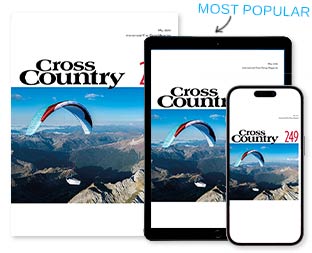Sandie Cochepain now flies ultralite paragliders in the French Alps. Here she is at home in Chamonix
Cross Country meets the French paragliding team including Sandie Cochepain, Denis Cortella, David Dagault, Zebulon Roche, Claire Bernier, David Casartelli and Fred Escriba. Published in 1999
With a healthy portion of the Alps and 24,000 pilots within its borders, you’d have thought that France would have the sport of paragliding totally sussed. The French paragliding team is powered on by a professional team coach, Yves Gouselain, and the pilots are part-funded by their government.
But whilst the pilots usually start their FAI team competitions with a bang, sooner or later everything falls to pieces. When it comes to clinching medals, the French just don’t seem to cut the mustard, and when mustard isn’t cut, fighting breaks out.
The team fell into disarray after personal clashes and stormy scenes during the Worlds in Castejon de Sos in1997 and the Europeans in Piedrahita, 1998. We went behind the scenes to dig the dirt.
Funding
For starters, every French pilot selected for a World Cup gets 2000 FF (roughly £200) to help cover his costs. Then there’s a ’points for prizes’ bonus system, where the achievers win money from a prize pool. And all the travel and accommodation costs for FAI team events are met.
In France, the government gives financial grants to all it’s elite sportsmen and women. But at present it’s felt that French pilots have too much financial assistance and don’t have enough motivation to fly well, so this year the team’s budget will be more orientated to prize money.
Twenty pilots form the French squad, from which a team is picked by Yves Gouselain. Over the years, pilots have fallen in and out of favour with the establishment, the most notorious being Richard Gallon. The squad has two weeks of official team training in April and further training befoore FAI team events.
SANDIE COCHEPAIN (Edel)
Sandie joined the French squad when she was talent-spotted by national coach Yves Gouselain at PWC Digne in 1993. Yves wanted to train Sandie over a three year period to replace Nanou Berger when she wanted to stop competition. The investment paid off, with Sandie winning the World Championships in 1997 and the European Championships in 1998, and coming second in the 1997 and 1998 PWC overalls.
Do you have any ambitions left?
A second FAI world title and a podium at the World Cup. It’ll be hard, but I have more sponsorship this year (Abac Ingenierie, the ATMB, Chamonix town, and also Edel). Also I would like to break my personal distance record in France which is 176 km; I want to try a 200 km flight through the Alps from south to north.
But my main objective is to have fun. In September I’m going on a hike/fly expedition with my school, Chamonix Parapente Azur, to Pachermo (6,271 m) in Nepal. It will be a great to share the experience with people who trust our teaching.
What are the reasons behind the frequent arguments within the French team?
Some pilots are more concerned with their personal result than the team result, which is selfish. Also, we are not together in the French team because we are good friends who want to hang out together, but only because we are selected. Some of us don’t enjoy friendly relationships, and I think we are all too self-confident. The permanent competition between Claire and me is a strain.
Who are your main rivals in competition at the moment?
My main rivals are Claire Bernier and Louise Crandal (Dk). I also think that this year we will have to consider the PWC Argentina winner Nicole Nusbaum (CH) as an important rival. She has the skill of a world champion, but not enough time.
Are you flying Serial or Open Class this year?
I’m flying in the open class with the Sector TX 4. I know my wing very well having flown in for two years, and it is still competitive against the other small current gliders.
At the end of 1998, Yves Goueslain advised me to fly serial class as I was really demotivated by all the accidents. I flew the Edel Response during the autumn, and took a lot of pleasure in winning the La Reunion Open. But I prefer the precision of my Sector. The serial class doesn’t make for safety.
Serial pilots will still fly beyond the safety limits of their gliders because it is really frustrating to see others overtaking you. I think the main contributing factor to many accidents is fatigue due to long tasks and the number of competitions packed into so little time. Last year I was wasted after two months of none stop competition through July and August. It will be the same this year! The calendar has to be more staggered.
How are you preparing to defend your title at the World Championships Austria?
I know that it will be a difficult, long comp. I think that Louise will be very good in the Pinzgau valley. It will be a hard race! I’m trying to prepare my body. I had a serious problem with my shoulder last year at the pre-worlds and it was really hard for me to finish the competition. I have to sort it out.
DENIS CORTELLA (Gin)
Thirty years old and from St Gervais in the Haute Savoie region, Denis is the current French champion.
There are a lot of pilots who are ’flash-in-the-pans’: they shoot up to the top then leave. How come?
Some rising stars get bored quickly, like Christophe Mougin, the young French pilot who won the PWC final in 1995. Competitions are very intensive, and life on the road with bad weather isn’t that exciting. If you only fly for results, it’s very demoralising, and when your results don’t come in, you stop.
What about the pressure of competitions? How do you think that affects pilots?
To be an excellent flyer isn’t enough in competitions. Someone like John Pendry doesn’t fly technically that well, he doesn’t fly like Andy Hediger or Peter Brinkeby in turbulence, but he has more patience and he stays lucid for longer.
But that ability to hold your concentration is so important. You can’t put pressure on yourself like David Dagault did in the last task of the Europeans. When you’re in the lead in a competition, and no-one knows if you are going to fly again because you have a dubious weather forecast, you have to stay cautious and fly conservatively.
But David went low and fast and landed. He is an alpine guy, he’s always flying low. And none of the best pilots are new, they’re all mature. Peter Brinkeby is good in World Cups but he cannot control his head for ten days in FAI events. Peter Luthi, Jimmy Pacher… all the pilots who have been flying for ages are still the best.
Do you get competitive with others?
If I fly at 100% then that’s all that matters to me. In competition, you learn how to lose, not how to win. The day you learn how to lose, you can start to win.
DAVID DAGAULT (FDI-Nova)
Winner of the Pre-Worlds in 1996, and leader of the 1998 Europeans until the final task, 23 year old David Dagault is widely respected as the fastest frog.
What happened in the Europeans? (David was in pole position until he blew it one the last task
Pressure. I had won the first task, did well the second, won the third task and was still leading the competition going into the fifth day. It’s very hard being in the lead, not knowing if the weather will stay good and how many more days you’ll have to fly.
On the fifth day I was in the front, and I glided into the Villatorro Pass very low. I was about 20 metres above the fields with Jimmy Pacher (who was second overall), then Jimmy just climbed out above me. I got a weak core but it got even weaker at about 200 metres.
So I raced off low again which was a bad idea. I landed to helplessly watch the rest of the field overtake me in the competition. I’ve always liked flying fast and low in the mountains, but you lose a lot of energy when you’re always pushing, racing hard, and that gets to you eventually.
How are you going to learn to deal with the pressure next year?
I’ll try and start each competition with a different attitude. I enjoy flying alone and in the front, but in the future I will try and think more and be more relaxed. I need to be a flying machine, not a competitive pilot, because competitions are about results, not feelings.
That’s quite a sad reflection!
From the start, I’ve always like flying alone and I still find it hard flying back with the lead gaggle. But I’ve got to realise that it’s impossible to fly ahead of the lead gaggle because they are flying as fast as possible given the risks of going down. I’ll try and be more Zen like next year.
ZEBULON ROCHE (Gin)
A book was written about Zeb’s climbing exploits when was only 12 years old. Zebulon went on to become the youngest person ever to climb Everest without the aid of oxygen, aged 17. Now 25 years old and having been flying for over half his life, Zeb’s passion for paragliding has overtaken his climbing instincts. He lives with Claire Bernier, and finished third at PWC Grand Bornard. But is he really happy?!
You were one of the first of the French to learn to fly?
Yes, I started in 1985. My father encouraged me to fly. He’s a mountain guide and he messed up his leg in a bad avalanche accident, so was looking for an easier way of getting down to base camp. He took some freefall chutes on expedition to Gannu in the Himalayas in 1983, and he got me off the ground two years later. I flew on a Finesse 4 off a mountain near home. The only thing I knew was I’d be OK if the wind was always in front of me. I was 12 years old at the time!
Do you find competition paragliding dangerous?
In my life, I’ve encountered so many harsh environments in the mountains that I don’t find competitions dangerous. But at the same time, if something doesn’t feel right, I won’t do it. My father and I climbed the north face of the Dru in winter to fly from La Niche de Dru, a tiny ledge near the top.
We made a line and used clothes pegs to attach my canopy’s leading edge to the line, but it was outrageous; a slope of 45 degrees then just cliffs all the way down. My father said, ah, it’s not so bad, but I couldn’t do it, so we called in the helicopter film crew to winch us of way down.
CLAIRE BERNIER (Edel)
PWC Womens’ Champion in 1995, ’97 and ’98, and ranked 16th overall in PWC Garmisch, Claire Bernier enjoys the respect of female and male co-competitors alike.
Being on the podium so regularly, do you ever lack motivation?
No. Even if I’m in the lead in the girls’ competition, I still like to compete with the boys. It’s more of a challenge. I don’t understand why the hang gliders have separate single sex competitions, it must be very boring for the girls as they can’t learn as much.
How would you describe your flying style?
Aggressive. I take my own options. If I’m at the back, for sure I will follow the route of others, but if I reach the top of a thermal first then I won’t wait for the others to catch up. I had to fight for the PWC title. I really detest the way some pilots just follow.
There were some stormy scenes amongst the French at the Europeans last year. How come?
Yes, in Piedrahita there was a bad atmosphere. The FFVL asked us to be a close, friendly group, but it was a two week long event, and it didn’t suit me to live crammed into a flat like that with people I don’t get on with particularly well. I’m not a very sociable a person.
I know it is a bad trait that I have. It takes me a long time to get to know people. There was a lot of criticism of me for not talking with the team on the radio, and I was called selfish. Well for sure I’m selfish, I think that all of us that fly paragliders are selfish.
But we don’t use radios in PWCs and I’m not familiar with them. They break my concentration. I talked with Yves after the competition and told him that I wouldn’t fly the worlds in Austria if we all had to live so closely like that again, and he finally agreed that the formula doesn’t work. We will all have more space next time!
A final word?
I’d just like to add that I really admire the flying level of the top 10 PWC boys of 1998. I think they’re amazingly good, unbelievably so, and I’d really like to congratulate them.
DAVID CASARTELLI (FDI-Nova)
Aged 29, from Chamonix, David has spent the last eight years in the French squad, and made his first appearance this year in European team. His girlfriend is Sandie Cochepain.
How’s life in the team?
It’s good, it’s interesting. It’s a team with many different sorts of people. In Piedrahita we had some misunderstandings which caused a bit of trouble. Normally it isn’t that bad, but it really blew out of all proportion this time. Some pilots are very individualistic, but I think FAI events are team orientated, after all it is our French association that is paying for us to be there. Plus it’s not easy having two girls in the same team.
How do the Swiss, the World and European team champions, continue with such success?
The Swiss are different. They bond well on the ground. They don’t use radios but they always fly together in the lead group. I think their team leader, Martin Scheel, tells them to change their flying styles for FAI events. Peter Luthi certainly does. In the Europeans he was always slowing down and waiting for his team mates, Bollinger and Von Kanel.
Who’s the most promising French pilot?
I think it is Denis Cortella. He’s good because he has to work hard to fly well. He puts a lot of effort into his victories. David Dagault is a more natural pilot but he is less tactical.
FRED ESCRIBA (FDI-Nova)
Fred, a 32 year old sports teacher from Annecy, joined the team in 1994. His best result last year was a 2nd place in a task at PWC Le Grand Bornard, and he ranked 26th in the PWC final listings.
What were the problems in the Europeans?
Claude Lemaire’s accident really broke something. We were all very upset by his awful injuries on the scond day. The team didn’t follow the strong advice of Yves Goueslain:to go slowly and let the others bomb out. We were way too confident and we flew in a risky way compared to the conditions. The Swiss team had the same orders from their team leader… and they accepted them.
David Dagault had too much pressure, but his solitary personality makes it difficult to help him. I think Yves gave him the right advice but I don’t think David listened. David is a great pilot, and sometimes the team leader will tell him something wrong and he will beat everyone in a major comp.
With regards to relationships, the fight between Sandie and Claire was strong again and they succeeded in bringing their boyfriends into the game. The end result was that we had one of the most famous fiestas in the history of the French team!
How is the team preparing for the Worlds?
No special preparations at the moment. We all know that the selected pilots will be the best ones, and whether a pilot flies a serial or an open class glider won’t be taken into consideration. I plan to fly with a serial class wing if Hannes Papesh builts a new one in time.
Apologies to Patrick Berod, Claude Lemaire and any other aggrieved team pilots for their lack of appearances. We could not track you down in time!
• Got news? Send it to us at news@xccontent.local
Subscribe to the world’s favourite hang gliding and paragliding magazine

